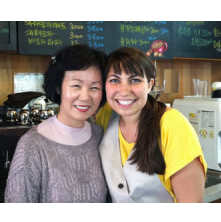Find out about IAC graduate assistant Alyssa Abraham's summer work in Korea. (This article has been translated from a Korean newspaper.)
“Helping Serve Refugees”
The graduate student Ms. Abraham said "When I first heard about the plight of refugees, I was moved."
At 2pm on June 14th at Jung-gu, Seoul Anglican Cathedral, a small take-out coffee shop in the yard 'Cafe Grace'. The foreign girl with blue eyes in Korean says "Here is your drink." She gives me a glass of iced Americano. Wearing a yellow T-shirt and jeans and a brown apron, American Alyssa Abraham (Abraham, 22), says in English “Mr. I do not have much experience yet. I made the coffee taste a little bitter. I do not even like it," he laughed.
A group of women from the Anglican Church made the café to support North Korean defectors to South Korea to help with their social adjustment.
A graduate student in the United States, Alyssa Abraham is volunteering at the café to work with North Korean women. She is a student from George Washington University in Washington, DC, majoring in International Diplomacy. Graduate student, Ms. Abraham arrived in Korea in the past two weeks, and has been working with this group since second day. Abraham said, "I am interested in writing on North Korean human rights of refugee women, and wanted to see their suffering in person," she said. She will be taking classes at a university in South Korea and is interning during the week.
Ms. Abraham’s interest in North Korean women was partly due to her sister. For two years, her sister has worked as an English teacher in Suwon, Gyeonggi and volunteered with North Koreans at a Hanawon and shared this story with her sister.
Abraham said: "South Korea and North Korea are one nation and one people, they are brother and sister, and I wanted to learn more about this rift" and "my heart hurts for the refugees.” She wanted to be respectful and did not want to ask too many questions at first. Many North Korean women experienced much trauma and I was reluctant to bring up painful memories with them. However, even though they have gone through hardships," tilting, Abraham said, "the North Korean women have been so warm and friendly," said, "I can relate and connect with them as a foreigner adjusting to life here in Korea.”
To work in the cafe is not easy because of the language barrier. To work with colleagues, they talk to their smartphones in their hands through a translation application. For example, to say in Korean, "a cup of coffee, please say" it translates in English "A cup of coffee, please,” because of this, an order may longer, but it was not a big problem.
Ms. Abraham will return to the United States in mid August. After completing a Masters degree she plans to keep in touch with good people she meets in Korea and continue to learn Korean.


